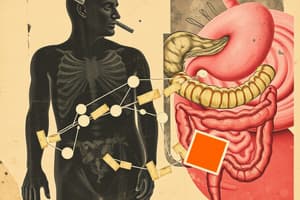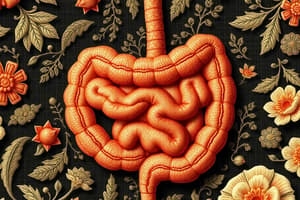Podcast
Questions and Answers
Where does most of the fat absorption occur?
Where does most of the fat absorption occur?
- Duodenum (correct)
- Stomach
- Jejunum
- Ileum
By which point in the small intestine are almost all digested lipids absorbed?
By which point in the small intestine are almost all digested lipids absorbed?
- End of the jejunum
- End of the duodenum
- Beginning of the duodenum
- Mid-jejunum (correct)
What is the stage of food in the small intestine where fat absorption occurs?
What is the stage of food in the small intestine where fat absorption occurs?
- Digestive enzymes
- Bolus
- Food fragments
- Chyme (correct)
Which part of the small intestine is responsible for the majority of fat absorption?
Which part of the small intestine is responsible for the majority of fat absorption?
What is the primary site of lipid absorption in the small intestine?
What is the primary site of lipid absorption in the small intestine?
What is the role of translocase in the cell?
What is the role of translocase in the cell?
What amino acids are used to synthesize carnitine?
What amino acids are used to synthesize carnitine?
Where is carnitine synthesized in the body?
Where is carnitine synthesized in the body?
What is the general term for a protein that assists in moving another molecule across a cell membrane?
What is the general term for a protein that assists in moving another molecule across a cell membrane?
How many ATPs are generated when NADH is oxidized in the electron transport chain?
How many ATPs are generated when NADH is oxidized in the electron transport chain?
What is the end product of the cleavage reaction catalyzed by thiolase?
What is the end product of the cleavage reaction catalyzed by thiolase?
What is the role of thiolase in the process?
What is the role of thiolase in the process?
What is the change in the number of carbon atoms in the acyl-CoA after the cleavage reaction?
What is the change in the number of carbon atoms in the acyl-CoA after the cleavage reaction?
In which step of the process does the cleavage reaction occur?
In which step of the process does the cleavage reaction occur?
What is the product of the oxidation of acyl-CoA by an acyl-CoA dehydrogenase?
What is the product of the oxidation of acyl-CoA by an acyl-CoA dehydrogenase?
What is the coenzyme for the dehydrogenase in the first reaction?
What is the coenzyme for the dehydrogenase in the first reaction?
How many ATP molecules are produced when FADH2 is oxidized in the electron transport chain?
How many ATP molecules are produced when FADH2 is oxidized in the electron transport chain?
What is the enzyme responsible for the oxidation of acyl-CoA?
What is the enzyme responsible for the oxidation of acyl-CoA?
What is the reduced form of FAD?
What is the reduced form of FAD?
What is the product of 8 acetyl CoA in terms of ATP?
What is the product of 8 acetyl CoA in terms of ATP?
How many high energy bonds are utilized in the initial activation reaction?
How many high energy bonds are utilized in the initial activation reaction?
What is the net ATP yield from one molecule of palmitate?
What is the net ATP yield from one molecule of palmitate?
What is the ATP yield from 7 FADH2?
What is the ATP yield from 7 FADH2?
What is the ATP yield from 7 NADH?
What is the ATP yield from 7 NADH?
Study Notes
Fat Absorption
- Most of the fat absorption occurs in the duodenum, with almost all digested lipids absorbed by the time the chyme reaches the mid-jejunum.
Carnitine
- Carnitine is synthesized from lysine and methionine in the liver and kidney.
- Translocase is a protein that assists in moving molecules across a cell membrane.
Fatty Acid Oxidation
- Step 1: Oxidation by FAD occurs through acyl-CoA dehydrogenase, producing Δ2-trans enoyl-CoA and reducing FAD to FADH2.
- FADH2 generates 1.5 ATP molecules when oxidized in the electron transport chain.
- NADH generates 2.5 ATP molecules when oxidized in the electron transport chain.
Cleavage
- β-Ketoacyl-CoA is split at the β-carbon by thiolase, producing acetyl-CoA and an acyl-CoA shorter by two carbon atoms.
- Each molecule of palmitate yields 8 acetyl-CoA molecules.
Energy Yield
- The energy yield from one molecule of palmitate is:
- 80 ATP from 8 acetyl-CoA molecules
- 10.5 ATP from 7 FADH2 molecules
- 17.5 ATP from 7 NADH molecules
- Gross total energy yield is 108 ATP, with a net yield of 106 ATP after subtracting 2 high-energy bonds used in the initial activation reaction.
Studying That Suits You
Use AI to generate personalized quizzes and flashcards to suit your learning preferences.
Description
Learn about the process of fat absorption in the digestive system, specifically in the duodenum and jejunum.




